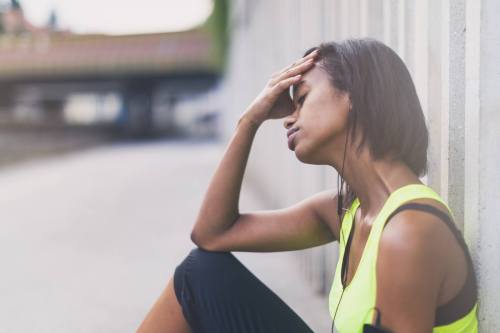Have you ever worked so hard while working out that you burst into tears? Yeah, same. In my life, it’s not just one isolated event, either. If I had a dollar for every time I’ve cried in a SoulCycle class, well, I’d be able to afford to take a whole lot more SoulCycle classes. But, I’ve also found myself weeping in hot yoga, Pilates, dance cardio, and one particularly intense run down the West Side Highway in New York City.
Experts in This Article
fitness instructor
sports psychologist, wellness coach, and fitness expert
Though I’ve always felt a little over the top when it’s happened to me in the past, it’s actually an incredibly common occurrence that has everything to do with the mind-body connection.
“As breathing, living, emotional beings we’re all susceptible to holding in feelings. These built-up emotions cause tension in our bodies that can be hard to release,” says Amanda Jenny, a group fitness master instructor. “It’s not uncommon for a high- intensity workout, where your body and mind are brought to exhaustion, to open the flood gates. It’s often the perfect storm: You’re in class, the energy is palpable, the song that’s blasting triggers something emotional, and your body feels like it’s got no juice left in it, and that’s when the tears start flowing.”
Your brain and body are essentially feeding off of each other when any sort of intense, workout-related emotions come on, according to Janine Delaney, PhD, a psychologist and fitness expert.
“It’s very normal to cry during a workout. There are hormones and endorphins released—similar to when people run and they experience what they call a runner’s high, thought that’s the opposite of crying,” she explains. “With any sort of exercise, there tends to be some sort of emotional connection. Your mind is picking up what your body is feeling, and your body is picking up what your mind is doing and vice versa.”
So, keep on scrolling for three of the most common occurrences when the floodgates tend to open for people during a workout.
Reasons you may cry during exercise
1. Exhaustion
You know when you see people burst into tears toward the finish line of a marathon? Well, that’s their exhaustion emoting.
“When your body gets tired or your mind gets tired, then you start to be compromised, and you start to feel different sorts of emotions, good and bad,” Delaney says, noting that this can happen during something as intense as a marathon or a triathlon, or even just in a new cardio workout that you aren’t used to. “It’s okay to feel that way, but you don’t want to turn that into something negative and then leave your workout in a slump, because it brought on all these emotions.”
If these types of emotions start to come on during a workout, do your best to embrace them, breathe through them, and let them go, so that you’ll be able to walk out of your workout feeling like a superstar.
2. Introspection
Certain modalities, like yoga and martial arts, ask you to look within and take emotional stock by way of meditation.
“Any sort of exercise that’s therapeutic or involves introspection or self reflection can sometimes bring people to get emotional,” Delaney says.
And that’s okay. We could all use a good emotional release once in a while, and if it happens in the middle of a yoga poses, so be it! Just breathe through the feelings and keep on flowing.
3. Frustration
If you’ve ever started to get emotional in a particularly difficult workout class, you’re not alone. It can be endlessly frustrating when you’re trying to do something and your body just won’t cooperate, like when you’re in a Beyoncé dance class the choreography feels impossible (been there), or the yoga teacher comes over to adjust you one time too many (been there, too).
Just remember: Every single person in that studio was a beginner at some point, no matter how perfect their headstand practice might be.
“Instead of using it as a negative to get yourself frustrated, be proud of yourself that your’e going outside of your comfort zone, and just try to give yourself some credit and use it as a positive,” says Delaney, who recommends taking some time to mentally prepare yourself before going in to an intimidating workout.
And remember, even if it’s making you cry now, it will (probably) make you laugh later.
“It’s very normal to cry during a workout…with any sort of exercise, there tends to be some sort of emotional connection.” —Janine Delaney, PhD, psychologist and fitness expert.
The benefits of crying during exercise
In general, crying releases endorphins and oxytocin, according to Harvard Health Publishing. These feel-good hormones can help ease physical and emotional pain, both of which can occur during a workout. Read on to learn more about the crying and exercise connection, and why it can be a good thing.
1. It releases stress
Working out is a form of physical stress, according to Harvard Health Publishing, which can feel exhausting and overwhelming at times. But after a good cry session, your parasympathetic nervous system (responsible for your “at rest” behavior) takes over, moving you out of “fight or flight” mode, according to the Cleveland Clinic.
2. It reduces pain
While you shouldn’t force yourself to keep working out if you’re injured, sometimes exercise comes with a bit of soreness or discomfort. The mental state you’re in can effect your perception of pain, according to the Cleveland Clinic. So, if your body already feels a bit strained and you’re not in the best state of mind because of it, you may begin to cry.
Like we mentioned above, once you start crying, your parasympathetic nervous system kicks in to calm you down, releasing endorphins, which are natural painkillers, per the Cleveland Clinic.
How to cope with tears during a workout
Suppressing emotions can, over time, lead to a host of health issues like anxiety, depression, heart disease, and cancer, according to the CALDA Clinic, a mental health rehabilitation program. With that being said, if you feel tears coming during your exercise session, let them out.
Positive self-talk in the moment can help, as does sharing what’s going on with the people around you if you feel comfortable doing so. It can also be beneficial to unpack what happened afterward (with your self or someone else), too.
FAQ
1. Why am I crying during my workout?
If you find yourself wondering, “Why do I get emotional during or after exercising?” it could be due to a few potential reasons. Among the most common are frustration, exhaustion, and introspection. Learn more above!
2. Do we feel better when we cry?
In a word: yes. When we cry, our parasympathetic nervous system (which governs our bodies at rest) kicks in, shifting you out of fight or flight mode. This makes us feel more relaxed. Additionally, crying releases feel-good chemicals like oxytocin and endorphins.
Sign Up for Our Daily Newsletter
Get all the latest in wellness, trends, food, fitness, beauty, and more delivered right to your inbox.
Got it, you've been added to our email list.











